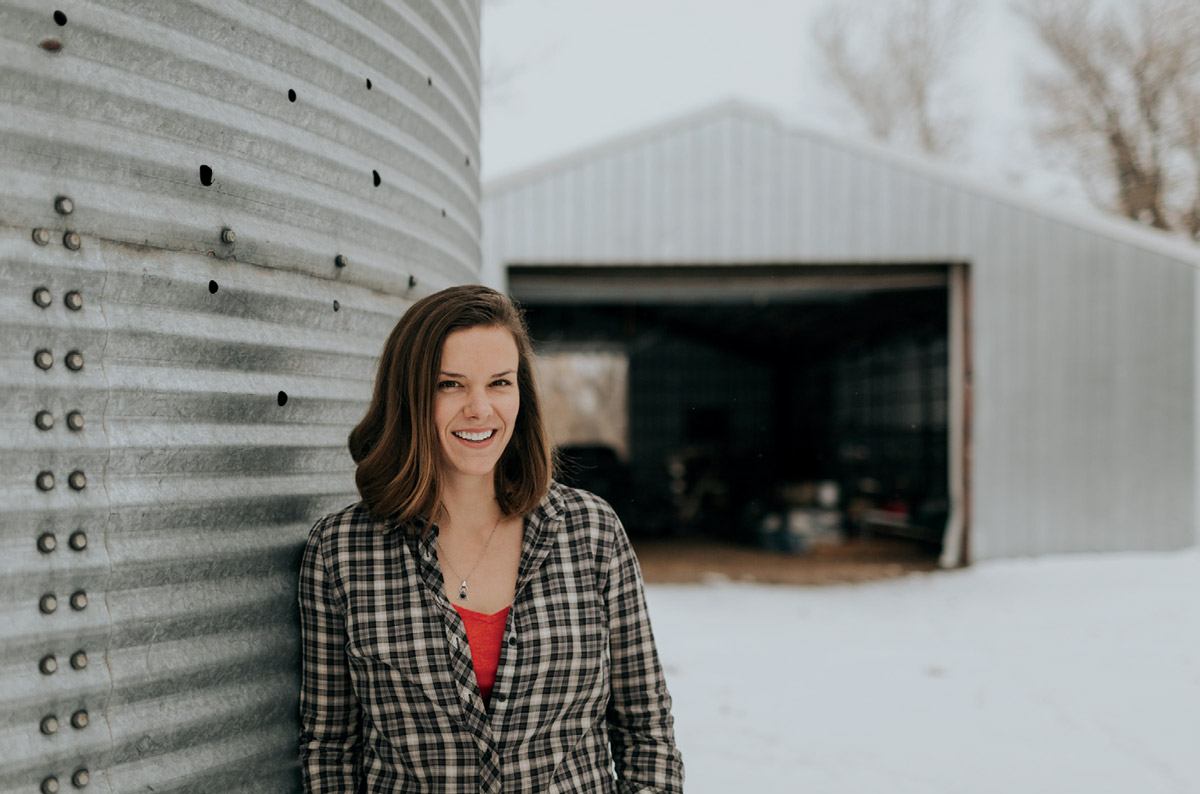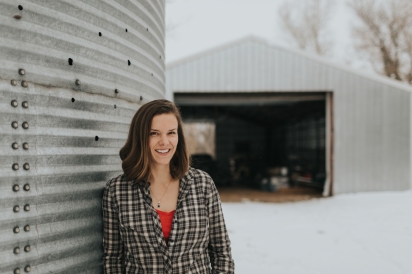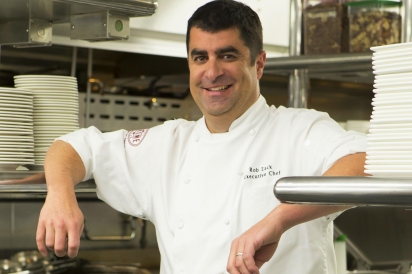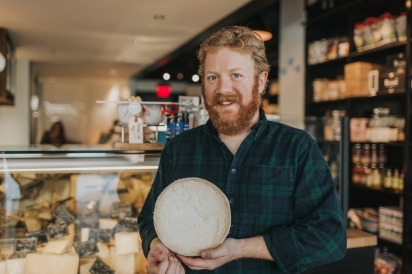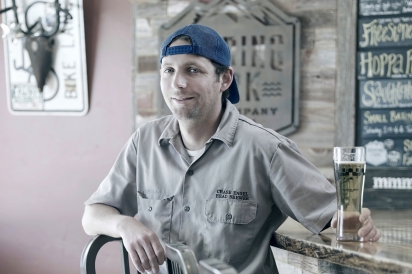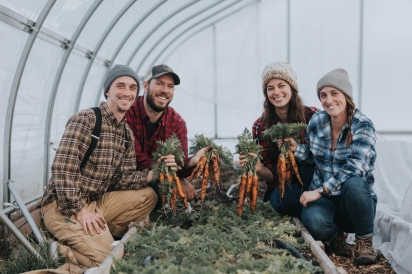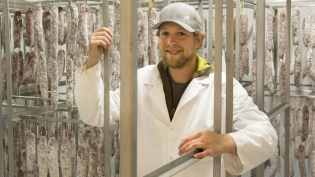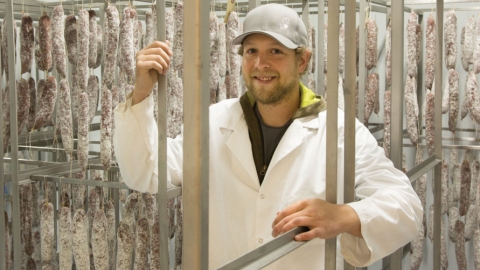Local Heroes 2017
Each year, we ask our readers to nominate their favorite food-related producers, artisans, educators and innovators from our community, and the individuals and businesses featured here received the most nominations this year. The winners display a passion and commitment to the tenets of food production, from an allegiance to organic produce, to combating climate change with sustainable farming methods, to being true to one’s creative self—all inspiring the local food movement. Hats off to this year's crop of Local Heroes!
Farm Farmer
Erin Cuseo/Erin's Acres Farm
Erin Cuseo started her one-acre vegetable farm last summer while leasing a plot at Cedar Ridge Ranch in Missouri Heights. “It was a blank slate. No one had ever tilled the land, or fenced or irrigated it,” she says. Working her micro-farm was a completely solo venture, unless you consider her two field hands, aged 4 and 6, who took breaks for afternoon naps.
Even with midday siestas, Cuseo and her children, Archer and Ayla, worked 12- to 15-hour days all summer, with a big payoff. The plot yielded nearly 4,000 pounds of produce, which Cuseo sold at the Carbondale and Basalt farmers’ markets and distributed to her 25 CSA members.
As a start-up farmer in a valley that’s become a magnet for young pastoralists, Cuseo is buoyed by others pursuing the same goal. “Our community is incredibly engaged and encouraging when it comes to local food. Although it’s easy to feel competitive, all of the farmers in the Valley want to see one another succeed, because we share the same goal: more farmers, more food.”
Cuseo will be getting more in touch with the local population this summer by moving closer to the Valley’s main artery. “The farm will be in a new mid-Valley home, on two acres, so we can expand and be more accessible, and closer to Highway 82, which is easier for consumers to access,” she says.
“I’ve really connected to this community, and have the opportunity to make a positive effect on people’s lives,” she adds. “It’s so rewarding every day. I may be exhausted and sunburned and frustrated with my job that day, but it’s so wonderful to have a direct impact on households. It’s the most honest, real work I can do.” Facebook.com/ErinsAcresFarm/
Chef Restaurant
Rob Zack/Prospect
Rob Zack started cooking in high school in Cleveland, eventually landing at the Hotel Jerome in 1994. By 1998, he’d worked his way up from line cook to chef de cuisine. After stints at other local restaurants (including opening his own eatery in Basalt), Zack returned to the Jerome as executive chef in 2012, after the property was sold and Auberge Resort Collection took over management. Zack oversees the hotel’s three eateries, including fine-dining restaurant Prospect. “It felt like coming home,” says Zack.
Because of the ownership change and subsequent remodel, Zack initially felt pressure to please everyone at Auberge, until he realized he wasn’t being true to himself. “At the Jerome, you’re going to get a meal that exudes the whimsy and spirit of the hotel and its Western feel. It will be well-prepared and modern, but you’re also going to recognize it.”
An example of Zack’s inventive cuisine is his Turkish breakfast bowl. The dish is a soft, spicy menemen with kale, avocado, black barley, feta and charred tomatoes. “It’s creative but still uses approachable ingredients,” he notes.
The key to Zack’s creativity is being aware of his surroundings. “You can go through your day and be pretty oblivious, but if you enter a conversation in the kitchen with someone from a different culture and they’re talking about something from home, it might inspire us to come up with something similar to what their grandmother made. We’ll just put a more refined, personal spin on it,” he explains. “The best dishes we do are conceived last minute, because it just flows. When I have to think a dish through for days, it’s never my best work.” HotelJerome.AubergeResorts.com
Food Artisan
Kevin McCullen/Avalanche Cheese Company
If cheese whispering were an actual thing, the magic would happen with the curds. At least that’s what Kevin McCullen, head cheesemaker at Basalt’s Avalanche Cheese Company, believes.
“I feel like I know the curds—when they need to come out, and when they need more time before we put them in the cheese forms. I know what they should feel like before the next step, and if they need to be stirred more or less.” McCullen is in charge of producing five styles of award-winning goat’s milk cheeses, ranging from fresh chevre to bandaged cheddar.
Despite his care with curds, McCullen credits a different entity for his great results: the goats on Avalanche’s Paonia dairy farm. “I’m taking the milk that our animals are providing, and presenting it in a different form. My job is easy, because they provide me with a raw ingredient that’s easy to start with. If you don’t have great milk, from animals that are well-cared for and happy, then it’s hard to make good cheese,” he elaborates. “It’s easy to screw up good milk but it’s impossible to make great cheese without it.”
Still, McCullen brings a singular focus to his work. “Zen is a decent description”, he says. “There’s a part of me that just likes being by myself in the creamery. You’re alone with your thoughts, and just focused on the cheese.”
That focus is expanding with McCullen’s newest creation. “I’m playing around with rolling fresh chevre in vegetable ash and aging it.” He smiles. “It’s a treat only for people in the Valley— we’re keeping it for the locals who know us.” Look for it at Meat & Cheese in Aspen—McCullen’s wife is the farm shop manager. AvalancheCheese.com
Beverage Artisan
Chase Engel/Roaring Fork Beer Company
In college, Chase Engel decided he was spending too much money on beer, so as a penny-pinching measure he learned to homebrew. “I was obsessed,” he says.
After creating his own recipes and experimenting with all manner of weird ingredients—“A phase every homebrewer goes through,” he admits—Engel learned simplicity was best, and focused on technically correct brewing.
His passion turned into a career and he spent time working at Ska Brewing, Oskar Blues and Aspen Brewing Company before opening Carbondale’s Roaring Fork Beer Company in 2014. “I saw this region needed more breweries, especially locally focused ones,” he says.
While his brewery (Engel’s title is head brewer and CEO; wife Aly oversees marketing and tasting room operations) focuses on “sessionable canned beers” for the retail market, the tasting room is often packed and offers a few small-batch, seasonal, barrel-aged brews that don’t get distributed.
At any given time, the brewery has eight to ten beers on the shelves of liquor stores from Aspen and Vail to Rifle and Grand Junction. Engel doesn’t want his beer to travel too far, so it will stay as fresh as possible.
Six of the beers he produces are year-round offerings; the rest are seasonal. “With 4,000 breweries in America and counting, there’s a lot of people trying to make eclectic beers, and I take the opposite approach,” says Engel. “I try to make ours the most flavorful, freshest and well-balanced. I put the ingredients together in a way that’s exciting, but not something you’ll drink just once. Success for me is if someone wants to drink another one right away.” RoaringForkBeerCo.com
Food Shop
Meat & Cheese Restaurant and Farm Shop
The namesake meat and cheese are just the first mouth-watering items that catch your eye upon walking into this specialty food and butcher shop-cum-restaurant. Advance a few steps more, and you realize you’ve been living far too long without treats like Chile Crunch, a savory blend of roasted chilies, garlic, onion and herbs; Xocolatl de David sourdough and olive oil chocolate bar; or Jeni’s Splendid juniper and lemon curd ice cream.
Owner Wendy Mitchell says she focuses on craft foods not found elsewhere in the Valley. “We try to interact with our customers and coach them about cooking at home, recommending things like our salts, chutneys or relishes. We get a good dialogue going. Our regulars come back and give us feedback, and it creates a real relationship.”
Mitchell’s own award-winning Avalanche Cheese Company products are featured alongside 50 or so other artisan cheeses, as well as a case of cured and fresh meats and a small but carefully curated produce section. While she finds gratification in her distinctive products, Mitchell says she’s proudest of her staff.
Farm Shop manager Elisa Orcajada holds a master’s degree in food culture and communications, from the University of Gastronomic Sciences in Bra, Italy, and is also married to Kevin McCullen, Avalanche’s cheesemaker. Orcajada’s enthusiasm for her products is infectious. “People love to hear stories,” she says. To wit: When she talks about Iowa-based La Quercia prosciutto, made from heritage hogs fed a diet largely comprised of acorns, she describes the resulting product as “something mythical and mystical.”
That magical quality is exactly what Mitchell has tried to create at Meat & Cheese. “My guess is that we’ve filled a need for people,” she says. “And we create a unique experience for our customers.” MeatAndCheeseAspen.com
Nonprofit Organization
ACES/Aspen Center for Environmental Studies
Most locals have been to at least one of ACES’s four properties: Hallam Lake (Aspen), Rock Bottom Ranch (Basalt), Spring Creek on Eagle-Thomasville Road and Toklat (Ashcroft). Each location offers a distinct ecosystem of sorts: wildlife sanctuary, ranch and farm, riparian habitat and wilderness lodge. The overall mission, however, is the same: to educate locals and visitors about environmental responsibility, forest health, land restoration, ecological literacy, environmental science and localized food production.
After 48 years in existence, the organization is intrinsic to the Valley, says Executive Director Chris Lane. “We believe we’re the environmental conscience of this community. We’re not purists, we’re partners. We believe our role is as community collaborators and connectors.”
Lately, ACES has made its primary relationship with Valley residents via their palates. The fastest-growing sector of ACES’s work is the sustainable agriculture program at their 113-acre Rock Bottom Ranch. “We realized we had to expand beyond what we’d done in the past, and growing food became a big part of that,” says Lane.
One of the biggest reasons ACES has embraced local agriculture is climate change. “The epiphany we had five years ago was that food production is more than 30 percent of anthropogenic carbon emissions. It can pollute water, air and has a tremendous carbon impact,” Lane explains. ACES is working to produce local food with a low carbon footprint, using greenhouses that require no energy, fertilizer, pesticides or herbicides, and using gravityfed water.
“The demand for local food is infinite,” notes Lane, “but we have a limited ability to get it out the door.” One way ACES will address that issue is with the launch of an online farm stand this summer, where customers can order produce and meat and have it delivered. AspenNature.org
NOMINATE your favorite Local Heroes for next year’s awards starting in September. Watch for an announcement and instructions on how to vote in our Fall issue.


